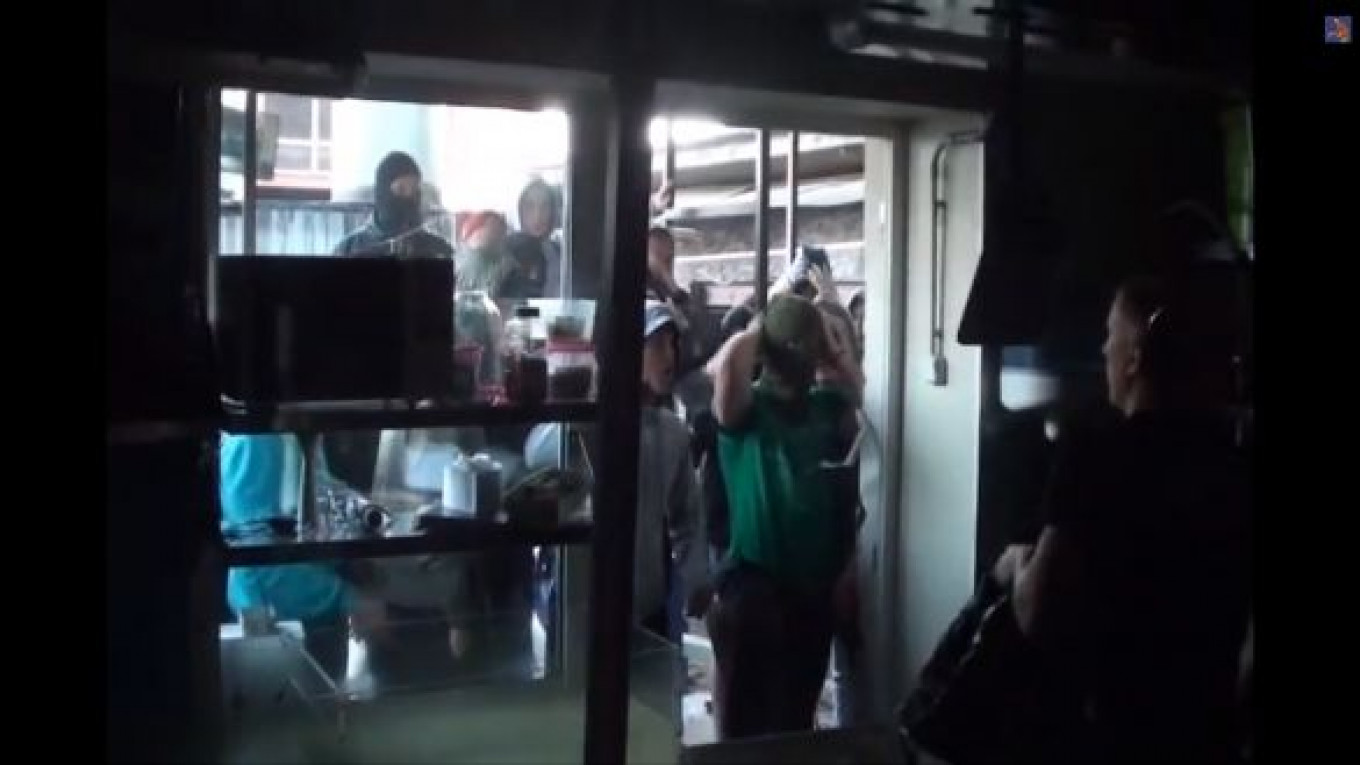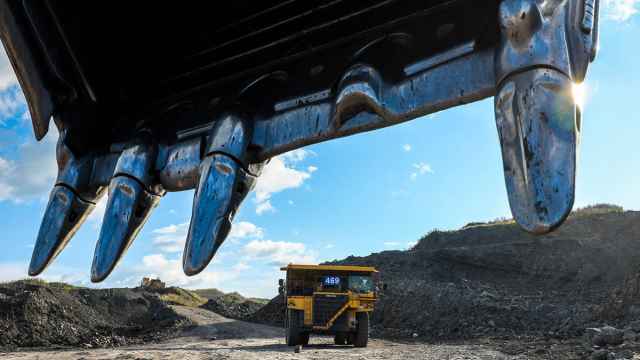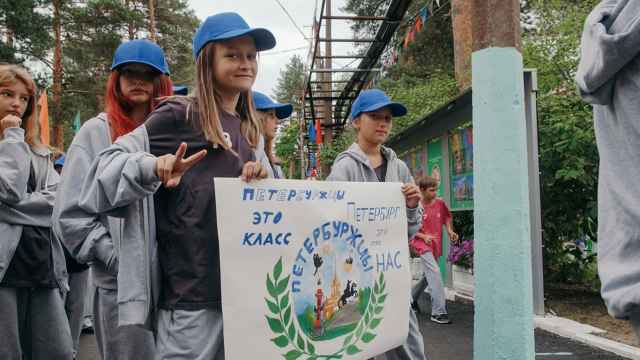Workmen cut the door from its frame, allowing a dozen men in balaclavas and hoods to enter a Moscow restaurant.
They chased out the staff with metal rods, beating one so badly he needed hospital treatment, smashing furniture and stealing computers and a safe, a video posted on YouTube showed.
In half an hour, the Georgian restaurant Khachapuri had been repossessed in the kind of raid that was widespread in the 1990s when the Soviet collapse gave birth to capitalism and a lawlessness that allowed protection rackets to thrive.
Such raids are now a rarity, but the violent closure of a business with a seven-year rental contract shows how Russia is failing to offer investors the kind of safe environment that its president, Vladimir Putin, says is needed to kick start the economy and diversify it away from energy dependence.
"They destroyed everything, they chucked us out on the street," said Tatyana Melnikova, one of the three owners of Khachapuri, describing the raid that was filmed by staff and posted on YouTube. "There was blood on the floors."
The raid is being investigated by police and many details are unclear but the case does highlight the weak property laws and limited legal recourse that are among the most commonly cited obstacles for doing business in Russia.
They particularly deter investors in small and medium-sized businesses which account for just 17 percent of gross domestic product compared with 50 percent in the U.S.
But big companies also fall foul of the system.
McDonald's, one of the first Western investors in Russia, has failed so far to defend its ownership of a building from the Moscow government which put it up for auction in November 2012.
A spokesperson said the company had filed a claim to challenge Moscow city's right to "own nonresidential property built by CJSC 'Moscow-McDonalds' at the company's own expense".
According to RAPSI, a legal newswire, the Moscow commercial court ruled in favor of the government and against McDonald's in February. It is not clear whether McDonald's will appeal.
Better "Krysha"
Putin made improving Russia's investment climate a priority when he returned to the Kremlin last year for a third term. He has since pushed through an amnesty on some economic crimes that has seen hundreds of entrepreneurs released from jail.
Critics say the changes are cosmetic and that the weak rule of law and collusion between corrupt law enforcement and justice officials still mean that victims of corporate raids lack adequate recourse to defend their rights.
Several small and medium-sized businesses polled in Moscow described an insecure environment with movable laws, weak enforcement and the threat of being targeted by government or law enforcement officials on the make.
Only one felt Russia's business climate was improving.
One foreign businessman, the sole outsider in a Russian media and communications company, said he and his partners sought out protection from two local investors who were "very well" connected politically, when they set up in 2007.
"We needed protection in case anything dodgy happened, if anyone decided to put pressure on us. So we wanted investors with connections," said the businessman, who declined to be named for fear of attracting unwanted attention.
The two investors, determined to keep their investment safe, successfully scared off a potential complaint from his former company in the new venture's early days.
"The old company backed down as soon as they met our new investors. We had the better 'roof'," he said, using the colloquial term "krysha", or roof, used to describe often criminal groups that operated protection rackets in the 1990s.
"We have never had a problem," he said of his company, which now has annual turnover of $40 million.
The owners of Khachapuri said they too were offered protection from a government official when they found themselves in the increasingly nasty rent dispute with their landlord, but he wanted 20 percent of the business.
It was tempting, Melnikova said, as less than a year into their rental contract, the landlord had cut off the electricity and water, stopped the waste collectors from taking the rubbish and threatened to use his contacts in government and the police to make life difficult for them, or shut them down.
She holds out little hope of winning her legal case.
"We started the court process, but so far the case is very poor, slow and hopeless," she said. "We ought to win because we worked in accordance with the contract, but there is only a tiny chance of it."
Her pessimism in the court process is something shared by many Russians A recent poll said 57 percent of respondents would prefer to avoid going to court.
Uncivilized
The lack of faith frustrates Russia's ombudsman for entrepreneurs' rights, who has worked with the government to create laws that support business but still hears from students that they would rather get a wage at a state-owned company than try their hand at business which is "not safe."
"We have a sophisticated legal system. … Our main problem is the execution of the law … with the spirit of the law we have the problem," the ombudsman Boris Titov said.
He said 75 percent of the about 3,500 to 4,000 complaints the regional and federal ombudsman receives are related to "administrative" matters — complaints over property, land, government contracts and regulation. All want to open, or close, criminal cases rather than go through the civil courts.
"It means that we still do not have a civilized corporate system. We have to develop it. We have to develop civil law and criminal law," he said.
Without a "civilized corporate system", small and medium-sized business owners say it is often a matter of luck whether a business attracts unwanted attention, fueling insecurity among a younger business class keen to launch cutting-edge ventures.
At 112th place in the World Bank's ease of doing business survey in 2012, Russia is a long way from Putin's goal of coming in at 20th place by 2018.
One restaurant owner said catering businesses were not often targeted because they were rarely seen as an attractive asset.
"I feel more or less safe. We pay all our taxes, we do not pay anything in cash and all our employees are processed, we follow the rules," he said of his business, which has been open for five years.
"The system is not perfect and is sometimes abused. Sometimes there are double standards, depending on who is in the opposite corner."
Property Rights
Russia's Supreme Arbitration Court, the highest of the courts that deal with business disputes between enterprises, said it heard 187,196 administrative disputes in the first half of 2013, compared with 389,625 in the same period a year ago.
The Heritage Foundation, a Washington think tank, gives Russia a score of just 25 out of 100 on whether laws protect private property rights in its 2013 index of economic freedom. The U.S. scores 85.
Melnikova showed the seven-year rental contract Khachapuri signed for the former garage buildings that they rented, and then renovated, and her government registration of ownership.
"But it means nothing," she said.
Some business owners interviewed for this article said they felt their futures depended on the whim of politicians, who have been toughening laws to appeal to a more conservative electorate and counteract a protest vote from younger, urban voters.
"You are protected as long as your property is not of any interest to the people in power," said one restaurant owner.
"It's impossible to completely protect yourself. You have just got to tolerate it."
A Message from The Moscow Times:
Dear readers,
We are facing unprecedented challenges. Russia's Prosecutor General's Office has designated The Moscow Times as an "undesirable" organization, criminalizing our work and putting our staff at risk of prosecution. This follows our earlier unjust labeling as a "foreign agent."
These actions are direct attempts to silence independent journalism in Russia. The authorities claim our work "discredits the decisions of the Russian leadership." We see things differently: we strive to provide accurate, unbiased reporting on Russia.
We, the journalists of The Moscow Times, refuse to be silenced. But to continue our work, we need your help.
Your support, no matter how small, makes a world of difference. If you can, please support us monthly starting from just $2. It's quick to set up, and every contribution makes a significant impact.
By supporting The Moscow Times, you're defending open, independent journalism in the face of repression. Thank you for standing with us.
Remind me later.






